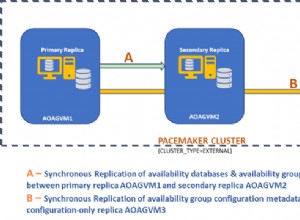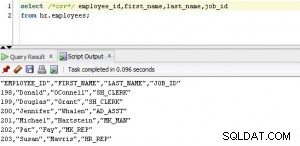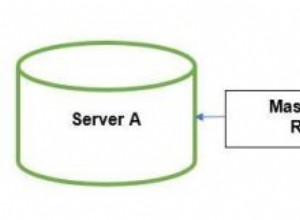Versions actuelles de jOOQ
jOOQ a un support natif pour JSON et JSONB types de données, vous n'avez donc rien à faire de spécifique.
Réponse historique
Depuis jOOQ 3.5, vous pouvez enregistrer vos propres liaisons de type de données personnalisées dans le générateur de code, comme indiqué ici :
https://www.jooq.org/doc/latest/manual/code-generation/custom-data-type-bindings
Contrairement à un Converter , un Binding dicte comment votre type de données est géré au niveau JDBC dans jOOQ, sans que jOOQ ne connaisse votre implémentation. C'est-à-dire que non seulement vous définirez comment convertir entre <T> et <U> type (T =type de base de données, U =type d'utilisateur), mais vous pourrez également définir comment ces types sont :
- Rendu en SQL
- Lié aux états préparés
- Lié à SQLOutput
- Enregistré dans CallableStatements en tant que paramètres OUT
- Récupéré à partir de ResultSets
- Récupéré depuis SQLInput
- Récupéré de CallableStatements en tant que paramètres OUT
Un exemple Binding à utiliser avec Jackson pour produire JsonNode types est donné ici :
public class PostgresJSONJacksonJsonNodeBinding
implements Binding<Object, JsonNode> {
@Override
public Converter<Object, JsonNode> converter() {
return new PostgresJSONJacksonJsonNodeConverter();
}
@Override
public void sql(BindingSQLContext<JsonNode> ctx) throws SQLException {
// This ::json cast is explicitly needed by PostgreSQL:
ctx.render().visit(DSL.val(ctx.convert(converter()).value())).sql("::json");
}
@Override
public void register(BindingRegisterContext<JsonNode> ctx) throws SQLException {
ctx.statement().registerOutParameter(ctx.index(), Types.VARCHAR);
}
@Override
public void set(BindingSetStatementContext<JsonNode> ctx) throws SQLException {
ctx.statement().setString(
ctx.index(),
Objects.toString(ctx.convert(converter()).value()));
}
@Override
public void get(BindingGetResultSetContext<JsonNode> ctx) throws SQLException {
ctx.convert(converter()).value(ctx.resultSet().getString(ctx.index()));
}
@Override
public void get(BindingGetStatementContext<JsonNode> ctx) throws SQLException {
ctx.convert(converter()).value(ctx.statement().getString(ctx.index()));
}
// The below methods aren't needed in PostgreSQL:
@Override
public void set(BindingSetSQLOutputContext<JsonNode> ctx) throws SQLException {
throw new SQLFeatureNotSupportedException();
}
@Override
public void get(BindingGetSQLInputContext<JsonNode> ctx) throws SQLException {
throw new SQLFeatureNotSupportedException();
}
}
Et le Converter qui est utilisé ci-dessus peut être vu ici :
public class PostgresJSONJacksonJsonNodeConverter
implements Converter<Object, JsonNode> {
@Override
public JsonNode from(Object t) {
try {
return t == null
? NullNode.instance
: new ObjectMapper().readTree(t + "");
}
catch (IOException e) {
throw new RuntimeException(e);
}
}
@Override
public Object to(JsonNode u) {
try {
return u == null || u.equals(NullNode.instance)
? null
: new ObjectMapper().writeValueAsString(u);
}
catch (IOException e) {
throw new RuntimeException(e);
}
}
@Override
public Class<Object> fromType() {
return Object.class;
}
@Override
public Class<JsonNode> toType() {
return JsonNode.class;
}
}
Vous pouvez maintenant enregistrer la liaison ci-dessus via la configuration du générateur de code :
<customType>
<name>com.example.PostgresJSONJacksonJsonNodeBinding</name>
<type>com.fasterxml.jackson.databind.JsonNode</type>
<binding>com.example.PostgresJSONJacksonJsonNodeBinding</binding>
</customType>
<forcedType>
<name>com.example.PostgresJSONJacksonJsonNodeBinding</name>
<expression>my_schema\.table\.json_field</expression>
</forcedType>




